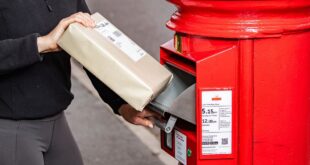A lot of the changes caused by Brexit have yet to be experienced by Brits because of the Covid-19 crisis.
Companies may be getting to grips with the new paperwork required to move goods across the borders, but in the locked-down UK there’s very little travel just now. It may be many months before business travellers and holidaymakers pile into European airports and we find out if leaving the EU makes a difference to the queues and the experience.
But anyone ordering goods online from European countries may have noticed a big difference.
With timing you just couldn’t make up as millions of people up their online orders in lockdown, any EU-based retailer who wants to send an item to the UK now has extra paperwork to complete – they must fill out a customs declaration form.
But the UK customer receiving that item may also find they have to pay extra; there could be VAT charges or customs charges to pay on the item.
So what do you need to know if you’re ordering goods from EU traders? And what do you need to do to make sure any parcels you send to the EU actually make it? Here’s what you need to know.
If any customs charges are due on items that are ordered from European businesses, those charges will usually need to be paid by the customer themselves, not the retailer they have bought from.
You should be contacted by Royal Mail, Parcelforce of the courier company bringing your order and they will tell you how to pay any fees that are due, including customs duty and VAT.
However, there have been cases of some customers having their parcels delivered but then being asked to pay the VAT upfront when they accept them.
Some EU brands, including a number of fashion outlets, have said they will charge a small additional admin fee on UK orders to cover the cost of any extra paperwork and processing. So when you do order from a European business, make sure you keep an eye out for any additional fees being added and factor them into decision-making.
One important thing to be aware of is that scammers are jumping on the confusion to steal money from unsuspecting Brits. Some people have received text messages claiming to be from Royal Mail and stating that they have a parcel awaiting delivery and need to click on a link to pay a fee.
These can be quite compelling, especially to anyone aware of the new rules, but they are an attempt to steal your sensitive data so don’t click and contact Royal Mail directly if you’re worried about ignoring a message.
Throughout January, parcels being sent from the UK to the EU faced delays and disruption, with quite a few being returned to the sender for not having the correct paperwork filled out.
Several courier firms actually suspended services into Europe for some periods because they were overwhelmed by the number of parcels that were sent without the right information. For example, DPD said that 20 per cent of parcels it had been asked to transport to the EU had been sent with incomplete or incorrect data attached.
Quite a lot of that may have been UK-based traders but some members of the public also found they couldn’t get their parcels delivered. Several delivery firms have also increased their fees to cover the cost of the extra work involved.
So if you are posting something to Europe, it is worth allowing it some extra time to arrive. Extra paperwork and the possibilities of delays at ports mean that there are increased risks of delays, especially in the middle of a pandemic.
If you are sending something that needs to arrive by a fixed date, such as a birthday present for example, then it’s worth getting it shipped a little earlier than usual.
But there’s another issue on the horizon that might result in British customers paying slightly higher prices.
Last week Mastercard announced it was going to increase interchange fees, which are paid by EU companies when UK customers make purchases with them and use a Mastercard.
These fees are paid to the cardholders’ banks and will rise in October from 0.3 per cent of every credit card transaction to 1.5 per cent – quite a jump. Debit card transaction fees will also increase, from 0.2 per cent to 1.15 per cent of every purchase made using a Mastercard.
The card provider has said these fees are not levied against consumers but against the merchants, so there won’t be an impact for UK customers.
But, of course, companies often pass on any increase in the cost of producing and selling their goods to their consumers, rather than letting it take a chunk out of their profits. In fact, these fees are capped within the EU in order to keep costs down for shoppers – so this could mean that some prices do rise when the new charges come in.
Source link



